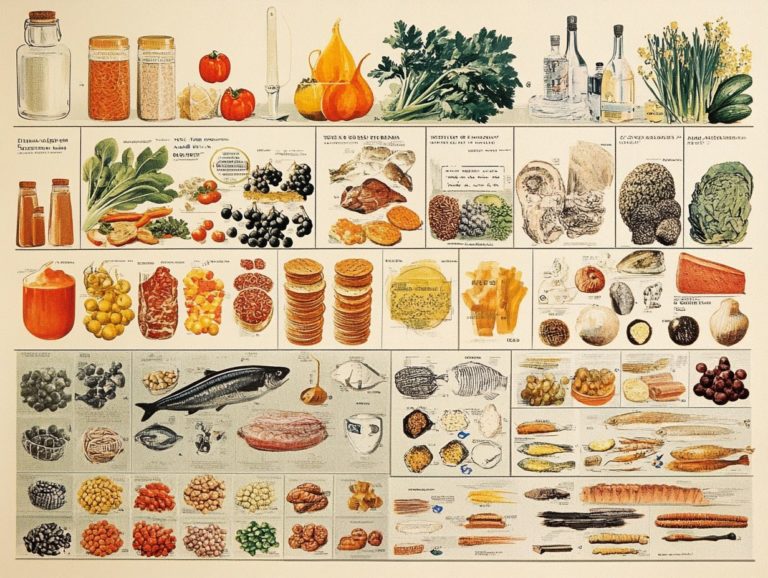The Importance of Daily Nutritional Guidelines
Navigating the world of nutrition can feel overwhelming. Understanding daily nutritional guidelines is crucial for maintaining a healthy lifestyle.
Think of these guidelines as your personal roadmap. They guide you toward informed food choices that enhance your overall well-being.
You ll explore what these guidelines encompass and why they matter. You ll also learn how to easily integrate them into your routine.
You will also discover the benefits of following these guidelines. Neglecting them can lead to serious health risks.
Prepare to empower your health journey!
Contents
- Key Takeaways:
- Understanding Daily Nutritional Guidelines
- How to Use Daily Nutritional Guidelines
- Benefits of Following Daily Nutritional Guidelines
- Risks of Not Following Daily Nutritional Guidelines
- Tips for Meeting Daily Nutritional Guidelines
- Frequently Asked Questions
- What are daily nutritional guidelines, and why should I care?
- Where can I find information about daily nutritional guidelines?
- How do I know if I am meeting my daily nutritional requirements?
- What happens if I do not follow daily nutritional guidelines?
- Are daily nutritional guidelines the same for everyone?
- Can I still enjoy my favorite foods while following daily nutritional guidelines?
Key Takeaways:

Understanding Daily Nutritional Guidelines
Understanding daily nutritional guidelines is essential for anyone looking to improve their diet. Crafted by the U.S. Departments of Agriculture and Health and Human Services, these guidelines are based on sound nutritional science.
Their goal is to promote health while preventing chronic diseases like obesity and heart issues. They encourage a balanced intake across various food groups to meet your nutritional needs.
What Are They and Why Are They Important?
The Dietary Guidelines are evidence-based recommendations. These help both health professionals and the public understand the best eating patterns for health and disease prevention.
Since the 1980s, these guidelines have aimed to address rising nutrition-related health issues in the United States. They shape policies that support healthy eating environments and provide vital nutrition education.
This guidance empowers community health organizations and schools. They can implement effective programs that align with recommended dietary practices.
The Dietary Guidelines are a critical resource. They guide you and your community towards healthier lifestyles.
How to Use Daily Nutritional Guidelines
To make the most of these guidelines, understand the recommended food groups and serving sizes. This knowledge can significantly impact your overall health.
Interpreting and Applying the Guidelines

Interpreting and applying the Dietary Guidelines requires translating evidence-based recommendations into practical changes. This means knowing what foods to include and understanding the nutritional science behind them.
Consider choosing dietary patterns like the Mediterranean or Dietary Approaches to Stop Hypertension (DASH) diet. These emphasize whole grains, fruits, vegetables, healthy fats, and lean proteins.
Start with simple swaps, like using olive oil instead of butter. Add colorful vegetables to your meals for a tasty boost!
By understanding how nutrients work together, you can make mindful choices that align with your health goals.
Benefits of Following Daily Nutritional Guidelines
By following these guidelines, you unlock numerous health benefits. This practice can significantly reduce the risk of chronic diseases like obesity and heart issues.
Improved Health and Well-being
Your commitment to healthy eating rules leads to improved health and well-being. These guidelines pave the way for better dietary patterns essential in the fight against chronic diseases.
By embracing these rules, you can make informed choices that enhance your overall wellness and longevity. For example, including a variety of fruits, vegetables, whole grains, and lean proteins can significantly lower your risk of heart disease and diabetes.
Foods like spinach, quinoa, and salmon not only deliver vital nutrients but also support a balanced diet that boosts your vitality.
Health professionals are invaluable partners in this journey. They provide tailored advice and encouragement to help you navigate dietary changes and achieve sustainable nutrition, improving your quality of life.
Risks of Not Following Daily Nutritional Guidelines
Failing to follow healthy eating rules can lead to significant health risks. This oversight may increase your risk of chronic diseases like obesity and iron-deficiency anemia, both of which profoundly affect your quality of life.
Potential Health Consequences

Ignoring healthy eating rules can have serious health consequences, leading to various chronic diseases stemming from poor dietary choices and a lack of health education.
For instance, regularly indulging in processed foods and sugary treats increases your risk of obesity, which often leads to complications like Type 2 diabetes. Take Tom, for example a middle-aged man who struggled with weight issues due to his fast-food and sugary drink diet. His diabetes diagnosis transformed his lifestyle, serving as a wake-up call.
Inadequate nutrition can also lead to cardiovascular disease. Research shows that diets low in fruits, vegetables, and whole grains significantly raise the chances of heart-related problems.
These examples highlight the serious risks you face if you ignore nutrition advice. They also emphasize the vital importance of health education in making informed dietary choices.
Tips for Meeting Daily Nutritional Guidelines
Meeting healthy eating rules becomes easier when you adopt practical strategies that foster a balanced diet and cultivate healthy eating habits in your daily routine.
Practical Strategies for a Balanced Diet
Practical strategies for achieving a balanced diet focus on mindful food consumption. This alignment helps you meet your daily eating habits with the Dietary Guidelines. By choosing a variety of food groups, you ensure your body receives diverse nutrients essential for optimal health.
Many communities effectively embrace meal planning techniques that elevate their dietary habits. They craft weekly menus that prioritize whole foods like fruits, vegetables, lean proteins, and whole grains while cutting down on processed options.
Some local initiatives offer workshops that teach families how to prepare nutritious meals using seasonal produce. These practices encourage engagement and enjoyment in healthy eating. Emphasizing these methods not only enhances personal well-being but also strengthens community bonds through shared dietary aspirations.
Frequently Asked Questions
What are daily nutritional guidelines, and why should I care?

Daily nutritional guidelines are recommended daily intake levels of various nutrients that you should aim to meet to maintain a healthy diet. These rules are important because they promote good health, lower the risk of chronic diseases, and help you meet your daily nutrient needs.
Where can I find information about daily nutritional guidelines?
You can find information about daily nutritional guidelines on government websites, such as the US Department of Agriculture and the World Health Organization. Many health organizations also provide resources on these guidelines.
Start making positive changes today to protect your health!
How do I know if I am meeting my daily nutritional requirements?
One way to know if you are meeting your daily nutritional requirements is by tracking your food intake using a nutrition tracker or app.
Don t hesitate to reach out to a nutrition expert who can help you thrive with personalized recommendations based on your age, gender, and activity level.
What happens if I do not follow daily nutritional guidelines?
Not following daily nutritional guidelines can lead to health issues like nutrient deficiencies and weight gain.
It can also increase your risk of chronic diseases like heart disease and diabetes. Eating a balanced diet according to the guidelines is crucial for good health and preventing these negative outcomes.
Are daily nutritional guidelines the same for everyone?
No, daily nutritional guidelines vary based on factors like age, gender, and activity level.
For example, pregnant or breastfeeding women have different nutritional needs compared to those who are not. It s crucial to find guidelines that fit your unique needs.
Can I still enjoy my favorite foods while following daily nutritional guidelines?
Yes, you can enjoy your favorite foods while following daily nutritional guidelines!
These guidelines promote balance and moderation, so including your favorites in moderation is perfectly fine. Focus on overall healthy eating patterns instead of strict restrictions.






